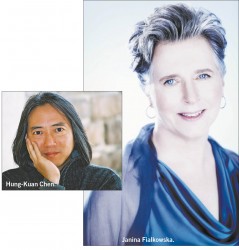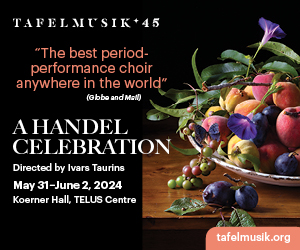As I sit here, on the coldest January day in Toronto on record since 2009, it’s almost comforting to have to turn my thoughts to the romantic, warmth-inducing, Valentine’s Day-inspired concerts that February brings. And, indeed, there is much to tempt us, an array of delightful performances to warm the “cockles of your heart” — metaphorical or otherwise, whatever they are — and, hopefully, the rest of your body, too.
 Chopin, obviously: Think fast. Most romantic composer? Answer: Chopin. Yes, there are others, and he may not be your first choice (or not your choice at all), but, let’s face it: it’s not really possible to get through a column about concerts in the “season of romance” without mentioning those featuring the works of Chopin. Besides, who would want to? For so many, myself included, it’s gorgeous, seductive, romantic music.
Chopin, obviously: Think fast. Most romantic composer? Answer: Chopin. Yes, there are others, and he may not be your first choice (or not your choice at all), but, let’s face it: it’s not really possible to get through a column about concerts in the “season of romance” without mentioning those featuring the works of Chopin. Besides, who would want to? For so many, myself included, it’s gorgeous, seductive, romantic music.
Chopin’s oeuvre consists mostly of solo piano works — nocturnes, waltzes, préludes, études, ballades, impromptus, polonaises and mazurkas, to name some of the most familiar and beloved. In addition, he also wrote two piano concertos, some songs set to Polish texts and a few chamber pieces. This month, we are treated to at least one ballade, waltz and polonaise, two sets of études (12 in each), his set of 24 préludes, a sonata, two scherzos, a chamber work and a concerto. So much Chopin, so little time ... or space.
So let’s get right to it; and don’t forget to check the Quick Picks at the end.
Chopin, not so obviously: Chopin is not the first composer to spring to mind when considering repertoire for a chamber choir known for its historically accurate performances of music from the Baroque and Classical periods. Then again, the Georgetown Bach Chorale is not your average chamber choir. In addition to its innovative choral programming, as part of its season it also offers concerts of orchestral, chamber and solo performances, often involving creative collaborations with guest artists, in unique venues.
Its February 10 and March 3 concerts are a case in point: the first is a 4pm house concert titled “Winter Moods,” and features guest cellist Mary-Katherine Finch and the Chorale’s artistic director/conductor, Ron Greidanus, at the piano, in chamber works by Debussy, Chopin and Prokofiev. Regarding the Chopin “mystery music” (“works by” is all we were told), it’s a safe bet to expect either — or possibly both (there are only two Chopin works for cello and piano) — the Cello Sonata in G Minor, Op.65 and/or the Grand Duo concertant in E Major B70, (written, jointly, with Chopin’s friend, cellist Auguste Franchomme). If that isn’t filling enough, for the $45 in-advance-only ticket, you also get a choice of hot stews, cheeses and homemade bread after the concert. If music — and stews — be the food of love, indeed!
“Relics of the Romantic Era,” on March 3, 8pm, in the quaint Norval United Church, will feature solo works by Chopin performed by guest pianist Matthew Pope, in addition to choral works by Reger, Brahms and Tavener. As stated in its brochure, it has always been a mission of the Chorale “to expand the musical experiences of its listeners.” Judging by these two concerts, clearly it’s “mission accomplished.”
And with that interesting detour out of the way, on to the solo piano music!
Formidable Fialkowska: Celebrated Canadian pianist Janina Fialkowska is a musical force to be reckoned with and a distinguished interpreter of Chopin’s piano works. Along the way, she received some excellent mentoring: after her prize-winning performance at the inaugural Arthur Rubinstein International Piano Master Competition, held in Tel Aviv in 1974. Rubinstein, himself, took her under his wing and helped launch her international career. The rest, as they say ...
But it wasn’t all smooth sailing. In 2002, Fialkowska’s hugely successful career was sidetracked by the discovery of a cancerous tumour in her left arm. However, her heroic recovery and successful “two-handed” return to the stage in 2004 — for 18 months, prior, she performed the “left hand” concertos of Ravel and Prokofiev which she adapted for the right hand — is, by now, the stuff of legend and widely documented, so I won’t go on. Besides, as she told the Financial Times’ Andrew Clark in a January 11, 2013 interview, she “hates“ talking about that hiatus in her career, though she recognizes that it “makes a good story” and that it inspires others. Clark adds: “That sense of life regained has transformed her music-making: her playing now has a spirit-of-the-moment freshness and spontaneity that many musicians strive for but few attain.”
That freshness and spontaneity will be on display when Fialkowska graces the stage at two concerts in February: one on Chopin’s birthday, February 22 (yes, March 1 is also often cited), at London’s Aeolian Hall, and the second a day later, on the 23rd, in Waterloo, for the Kitchener-Waterloo Chamber Music Society. Both concerts offer works by Chopin, Grieg and Schubert; the Aeolian concert, however, is another “works by” situation; the “fleshed-out” repertoire provided by the KWCMS suggests what Fialkowska might also play in London (but no guarantees): Schubert’s Four Impromptus D935, Op.posth.142, four Lyric Pieces by Grieg, and the following works by Chopin: Polonaise in E-Flat Minor, Op.26 No.2, Scherzo No.4 in E Major Op.54, Scherzo No.1 in B Minor Op.20, Waltz in A-Flat Major, Op.64 No.3, Mazurka in C Major, Op.56 No.2 and Mazurka in C Minor, Op.56 No.3. If I had my druthers, I’d go to both concerts!
Chopin at noon: While Chopin’s sublime, sensuous music may be tailor-made for late-night listening, who says you can’t enjoy it during daylight hours? This month, as part of its popular free, noon hour Piano Virtuoso Series, the Canadian Opera Company offers two concerts featuring piano works by Chopin. For the first one, “Reflections,” on February 26, pianist Connie Kim-Sheng, a 2010/11 Glenn Gould School Concerto Competition winner, performs Ballade No.3 in A-Flat Major, Op.47; the program also includes the first movement of Beethoven’s Sonata No.31 in A-Flat Major, Op.110, Miroirs by Ravel and Rachmaninoff’s Études-Tableaux Op.39 No.5. “Shades of Chopin,” the second concert on February 28, features a young Saskatoon-born pianist, Justin Min, in an all-Chopin program, including the Sonata No.3 in B Minor, Op.58, his final piano sonata. Perfect lunchtime fare!
Études vs. Préludes: One might call it an embarrassment of riches, when two extraordinary pianists are scheduled to perform in recital, on the same day, at basically the same time, with Chopin on both programs, no less. Here’s what’s happening on March 3: at 3pm, Jan Lisiecki, the prodigiously gifted, 17-year-old pianist is performing Chopin’s two sets of 12 Études, Op. 10 and Op. 25, at the Royal Conservatory’s Koerner Hall. And over at Walter Hall, at 3:15pm, the brilliant (and clearly more seasoned) Hung-Kuan Chen is making his Toronto debut in a performance of the 24 Préludes Op.28, for Mooredale Concerts; Chen’s program also includes Mozart’s A Little Gigue in G Major KV574, a fragment from his Suite in C Major KV399, and Schubert’s Sonata in C Minor D958.
Jan Lisiecki is known to, and has dazzled, Toronto audiences; he’s also been featured in the pages of The WholeNote and in video interview at Conversations@TheWholeNote. Hung-Kuan Chen, on the other hand, is new to The WholeNote, so a few more words are warranted.
Taipei-born and raised in Germany, Chen shares more than one thing in common with Janina Fialkowska: both were prize winners of the Rubinstein Piano Master Competition (he in 1983) and both, curiously, experienced serious damage to the tools of their trade and a remarkable recovery from the damage. Chen suffered an injury to his right hand in 1992, that caused neurological damage, resulting, eventually, in focal dystonia, a disorder consisting of confused motor commands. In an article Chen penned, he describes the disorder: “When the brain is sending overly complex and conflicting messages, the commands are conflicting and the fingers become stiff in the process. A fitting visual analogy would be the old style telephone switchboard with tangled-up wires.” Read more about Chen’s journey at focaldystonia.co.uk/#/piano/4563030880.
Like Fialkowska’s, Chen’s return to the stage, in 1998, was met with rave reviews and he has gone on to a celebrated career. A reviewer for the Boston Globe had this to say in 2006: “Hung-Kuan Chen is back in prime technical form ... This man plays music with uncommon understanding and the instrument with uncommon imagination.”
And it is our uncommon good fortune to have the choice between Lisiecki and Chen. Perhaps it will all come down toétudes vs. préludes.
A Little More Love and Romance:
Some Heart-Warming Quick Picks
Feb 01 8:00: Aurora Culture Centre. Great Artist Piano Series:
Chu-Fang Huang, piano. Haydn, Chopin, Wanghua Chu and others.
Feb 07 8:00: Toronto Masque Theatre. Les Roses de la Vie: A Parisian Soirée. Music by Marais, Couperin, Chopin, Fauré, Debussy, Poulenc, Aznavour and others. Also Feb 8 and 9.
Feb 12 8:00: Music Toronto. Piano Series: Gabriela Montero, piano. Brahms: Three Intermezzos Op.117; Schumann: Fantasie in C Op.17; Montero: improvisations.
Feb 14 8:00: Hart House Orchestra. Violins and Valentine’s Day: A Perfect Match. Schumann: Second Symphony; Beethoven: King Stephen Overture; Copland: Clarinet Concerto.
Feb 14 8:00: LUSH Cello Quartet. An Evening with LUSH Cello Quartet. Love-themed songs and classical works.
Feb 14 8:00: Toronto Concert Orchestra. Love Notes. Tchaikovsky: Violin Concerto; Saint Saëns: Suite in D; Gray: Introduction and Autumn Prelude. Christoph Seybold, violin; Kerry Stratton, conductor.
Feb 16 8:00: Kindred Spirits Orchestra. Beethoven, Schumann, Mendelssohn. Beethoven: Overture to Fidelio Op.72c; Schumann: Piano Concerto Op.54; Mendelssohn: Symphony No.3 Op.56 “Scottish.”
Feb 16 8:00: York Symphony Orchestra. Romantic Legends. Tchaikovsky: Polonaise from Eugene Onegin; Romeo and Juliet Overture; Capriccio Italien; Chopin: Piano Concerto No.1; also Feb 17.
Feb 19 8:00: Toronto Symphony Orchestra. Love Will Keep Us Together. Songs by Porter, Berlin, Mancini and others. Betsy Wolfe, soprano; Mike Eldred, tenor; Steven Reineke, conductor. Also Feb 20 (mat and eve).
Feb 24 5:00: Nocturnes in the City. Anna Betka, Piano. Works by Beethoven, Bach, Schumann, Prokofiev and Smetana.
May your hearts be warmed and your senses seduced. Enjoy!
Sharna Searle trained as a musician and lawyer, practised a lot more piano than law and is listings editor at The WholeNote. She can be contacted at classicalbeyond@thewholenote.com.



